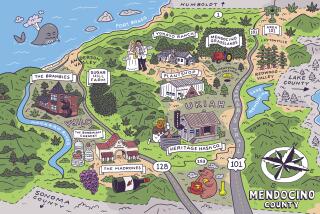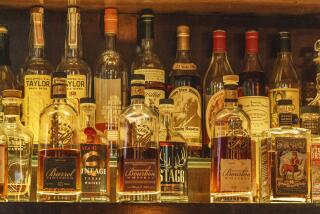In Moonshine Hollow, Raids on Stills Become a Curiosity : Law enforcement: Homemade booze supplemented a farmer’s income for 40 years until a prospective buyer tipped off the feds.
- Share via
CUMBERLAND, Md. — The bells on Edward Shenk’s cows call out from up the hill, their choppy tune carried faintly on a breeze drifting through leaves of poplar and maple.
A muddy road leads toward the sound, emerging from the trees into a grassy hollow where the cows dawdle in the sunlight amid a sprawl of discarded wooden packing crates. Sitting at the far end of the clearing are a slouching old barn and a red and yellow house trailer. The cows, spotting a visitor, trot away in alarm.
Welcome to Shenk’s little farm in the hills near Cumberland, also known as Moonshine Hollow.
Shenk makes whiskey here, or used to until a few months ago, when five state revenuers for the Alcohol and Tobacco Tax Enforcement Unit walked out of the woods one rainy Tuesday afternoon to stop the whole thing. They poured out his bubbling barrels of mash--which Shenk’s hogs quickly lapped up--and disconnected the propane tank from the four burners beneath his 60-gallon copper pot still.
Shenk had cleverly placed the rig inside one of the weathered gray packing crates near the barn, and he had lined up the plastic barrels of mash inside the trailer. But the state agents were wise to the camouflage. They had crawled through the woods around the clearing during two weeks of surveillance and knew exactly where to look when they approached Shenk.
“One of them walked up,” Shenk said. “He showed his badge and said, ‘Do you know what we’re after?’ And I said, ‘Hell, yes, I know what you’re after.’ ”
Shenk paused. Wanting to be neighborly about all this, he added: “They were very polite, a friendly bunch of people. They laughed and joked the whole time.”
The agents can usually afford to be polite these days. The old days of moonshine shoot-outs are as good as gone, and raids have become so rare that they are curiosities. A state police officer who got wind of the raid on his scanner wheeled up the muddy road to see the show, and two of the five agents were on hand mostly to look and learn.
That’s because Shenk is literally part of a vanishing breed, said Marvin Bond, a spokesman for the tax enforcement unit. “A lot of the old guys who do this are dying off,” he said.
Well, maybe, Shenk said. Then he added, with a twinkle in his eye: “There are more people doing this than you’d think.”
Shenk pleaded guilty recently in Allegany County District Court to charges of manufacturing illicit whiskey and possessing untaxed alcohol. He could have been fined up to $10,000 and sent to jail for up to five years on each count. But Judge Paul J. Stakem levied only a $500 fine and a suspended six-month jail sentence and put Shenk on unsupervised probation for two years.
At 55, despite a penchant for chain-smoking, Shenk probably has more than a few good years left should he ever decide to re-enter the business. Though his right hand is twisted and crippled, his tanned, crinkled face shows that he still spends plenty of time outdoors, and the mud and grime on his clothes and boots attest that he still slogs through the muddiest of fields to get the chores done.
Shenk comes by the trade honest. His father took up moonshining in the hills of Page County, Va., when Shenk was as young and frisky as the young calves on his farm.
“I was 2 or 3,” Shenk said. “He taught me how when I was 14 or 15.”
Shenk got two pieces of advice from his dad: “Never sell to a stranger, and always make good whiskey. If it’s no damn good, nobody will want to drink it.”
In the days of Shenk’s childhood, whiskey making was booming all over the Southeast. One bunch in Kentucky in the 1930s was even so brazen as to come howling out of the hills one evening, guns firing, to bust up a tent revival where a prohibitionist was railing against the evils of alcohol.
In 1937 alone, federal agents seized 3,406 stills in the region that included Maryland, Virginia, West Virginia and North Carolina. Volume dropped off in World War II with the shortage of manpower and the rationing of sugar.
But after the war, business picked up again, so much so that it seemed ready to grow into a well-organized concern that would squeeze out the Edward Shenks of the world.
W. T. Benson, then director of Maryland’s alcohol tax unit, complained in 1948: “You don’t have your old-time mountaineer type of bootlegger anymore except in the back hills of South and North Carolina. . . . The operators today are slick. They can make liquor faster than ever. They use powerful cars to make their deliveries and get in touch with each other by short-wave radio.”
But Benson’s prediction proved premature, although the moonshine business remained strong into the late 1960s. State agents found stills just about everywhere.
But the rapid rise of sugar prices in the 1970s put the business mostly back in the hands of the small-timers, who insist that they are in the trade for quality, not quantity. And even the gasohol-inspired era of the late 1970s--when the Mother Earth News was teaching anybody who cared to learn how to brew their own alcohol for fuel--failed to trigger another boom.
“We had feared what was going to happen with gasohol was that a whole new generation of people would come up with this stuff,” Bond said. “But that really hasn’t happened. The reason probably is that drugs are so much more profitable.”
During all this time, Shenk has made moonshine in several places. A few years back, he bought a fine-looking copper still in North Carolina. He ran it for a while in his house in Cumberland, then moved it last winter up to the little farm that he rents. He learned later from the landlord that during Prohibition, the place was called Moonshine Hollow.
Shenk couldn’t have made much money on his moonshine. The capacity of his still, which he fed with rye mash, was about 39 gallons a week. At an asking price of $20 to $25 a gallon, that would provide a gross income of about $780 a week. The cost of sugar, rye and glass jugs cut deeply into that.
So, then, why make whiskey at all? “I just made it for certain guys in Cumberland,” Shenk said.
Indeed, “there is a market for this,” Bond said. “Some people swear they prefer the taste.”
Does Shenk like the flavor? “Never drinked a drop in my life,” he said. “Never. I’d tell how good it was by looking at it. . . . The only way you can tell if it’s potent or not is to put some in a spoon and see if it burns with a blue flame.”
Brewing up a batch is not difficult, Shenk said, just time-consuming. “But you got to know what you’re doing. If you don’t have a nice copper outfit, you’re in trouble already. Too much poison stuff.”
That is because some moonshiners, apparently less concerned about quality control, have used such methods as adding lye to speed fermentation of the mash, or using an old car radiator, with its residual brew of chemicals, as a condenser.
Such health hazards are the major reason that the state still seeks out stills because the loss of tax revenue is probably negligible.
Shenk did make one concession to the shiftier methods, however. He placed the still amid his livestock, a device often used to help mask the ripe sour smell of moonshine in the making.
So, in a sense, you might say Shenk’s cows and hogs were unwitting accomplices in his scheme. The hogs took their complicity a step further as the designated devourers of the used-up mash.
But in the end, it was Shenk’s strict adherence to his father’s advice that got him into trouble with the law. A fellow he didn’t know asked to buy some moonshine, and Shenk refused. The fellow got mad and tipped off the revenuers.
So now, his still gone, Shenk concentrates on the livestock. Eyeing his newest calves, he rates one a potential prize-winner, but writes off the other as a hopeless scoundrel.
The hogs, meanwhile, seem forlorn, subsisting on a new, more limited diet: no more mash in Moonshine Hollow.
More to Read
Sign up for Essential California
The most important California stories and recommendations in your inbox every morning.
You may occasionally receive promotional content from the Los Angeles Times.













